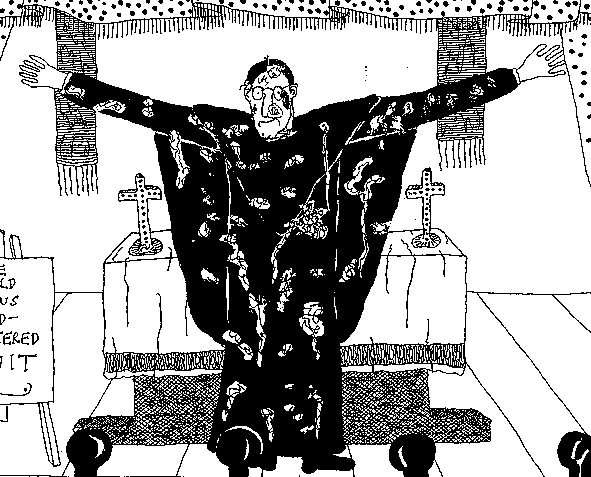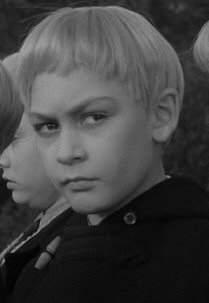The first I knew of the mutterings was when I overheard them, being muttered. A door was ajar, and I was in the corridor with my pail and my mop. Through the ajar door I heard the mutterings, but only for a few seconds, because suddenly the door was slammed shut, from within, presumably by one of the mutterers. I stood waiting awhile, in case the door might be opened again, but it was not, so I moved on along the corridor, towards the holy golden slab.
You might wonder what a holy golden slab was doing in the corridor of an otherwise nondescript municipal office building. Somebody once told me that the explanation was only given on a need to know basis. What arrant poppycock! I think that person was trying to intimidate me, or to put me in my place. I would dearly like to know if he was among the mutterers behind the now closed door. Well, I will find out, by hook or by crook. What either a hook or a crook would avail me in the circumstances I do not presume to guess. But there is always a nugget of wisdom to be found in common sayings, so perhaps one of these days I will go down to the basement and rummage around in the storage cupboards to see if a hook or a crook, or both, have been discarded there, at some point, by one of my predecessors. How I will then proceed I do not yet know. Perhaps it will come to me in a dream.
It was in a dream that I learned why the holy golden slab is where it is. It was vouchsafed to me by the night-time goblins that control our dreams that the holy golden slab has always been there, in the same spot, for as long as history. The building was built around it, you see. I think the holy golden slab was meant to be in a room all by itself, a locked room, but somehow the building’s blueprints were misinterpreted, and it ended up being at the end of a corridor. They could have put in some panels and created a room around the holy golden slab, shortening the corridor a little, but money ran out. Imagine that! Not enough money in the coffers for a few panels.
That was a hundred years ago, of course. I expect there is money for panels now, but everybody has got used to the holy golden slab being in the corridor, and it is no longer thought important enough to be hidden away in a room of its own. Funny to think that it was once an object of awe and trembling. I was awestruck and trembling when I saw it in my dream. But in the pitiless light of day, when the goblins loosen their grip on our brains, I, like everybody else, feel neither awe nor trembling. I mop the floor around the holy golden slab as a matter of routine, and once in a while I run a duster over it.
One of my predecessors put a tarpaulin over it, to save on dusting. The very next morning he was found in a dingy alleyway. His throat had been slit.
On my way down the back staircase to the basement, to pop my pail and my mop into a cubby, I began to wonder if the mutterings I had overheard were something to do with the holy golden slab. I had not been able to pick out individual words, in the few seconds of my overhearing, but an inkling nested in my brain and would not be dislodged. I wondered if the goblins of the night might tell me more, when my head was apillow. But they had nothing of relevance to impart. I dreamed of dogs barking in a rowing boat in the middle of a lake, and the crushing of a rebellion.
The next day I noticed that the door in the corridor was ajar again, And yes, as I stepped closer, I heard mutterings. This time I hoped I might be able to make out something of what was being muttered. Then I could rest easy, without having fantastic thoughts about the holy golden slab pinging round and round and round in my poor overheated brain. It needed a bit of mopping itself, were that a possibility. But again the ajar door was slammed shut when I had been loitering for bare seconds. Obviously the mutterers wanted to keep me in the dark. But how did they even know I was there? Mirrors, probably.
This went on for a week. The door was always ajar, and it was always slammed shut before I could hear clearly what was being muttered. As for the holy golden slab, no change there. But then there never had been any change, since the dawn of recorded time, or at least since time immemorial, which legally, as I understand it, is any time before the sixth of July 1189. As for me, I went on toiling up and down the corridor with my pail and my mop, I went on skulking down to the basement, and every night I rested my head on my pillow and bid the goblins start up their frolics in my sleeping brain.
What I did not know, and learned only later, much later, was that one by one the mutterers were found in a dingy alleyway with their throats slit. I found out all the grisly details when they arrested me, and charged me with the killings. Ever since that six in the morning hammering at the door, and the handcuffs and the blanket over my head, the night-time goblins have fallen strangely quiet.
Now, it is as if I have an empty head.
[And the above is the result of determinedly bashing out a thousandish words while in the grip of empty head, or vacancy between the ears, syndrome. Must do better.]




